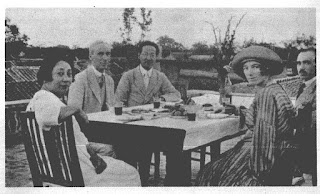Nicky
Harman writes: It seems obvious that there is literary translation from English
into Chinese, as well as from Chinese into English, but very little has been written
in English about what travels in that direction, and what impact it has on Chinese
readers. It is a subject that fascinates me. So I was delighted when I got the
chance to interview Wang Bang.
Wang Bang
has translated Peter Hughes’s
Behoven poems (Oystercatcher Press,
2009) for Professor He Ping, a well-known critic, author and professor
at the College of Arts at Nanjing Normal University. Readers can explore
them on this bilingual page here.
I asked her to tell me more about this project.
N:
How did you come across Peter Hughes and Oystercatcher Press, and what do you
like about his poetry?
W: The first time I bumped into ‘oystercatchers’, they were not those waders with red beaks, dressed in black cloaks, they were well printed pamphlets with abstract, geometric, mostly hand-painted covers, the kind of visual vocabulary that recalled me to Abstract Expressionism. I soon learnt that they were poetry pamphlets produced by the poet Peter Hughes, who also used his own paintings for the covers. I was immediately intrigued and was hoping to write an article about Peter. I asked David Rushmer, my husband, who is also a poet and had been published by Oystercatcher Press, to introduce me to Peter. A week later, we were in Norfolk, walking against the brisk wind, the oystercatchers rising swiftly from the waves, whilst Peter narrated his early life stories to me from his house on the coast; his surreal adventures working as a translator for the Italian Army and how he endeavored to make sense of the instructions on Russian landmines. I then wrote a story titled ‘The Poet Who lives next to the Lighthouse’; it was surprisingly well received and hit over 600 likes overnight. I thought it could be a great opportunity to introduce Peter’s work to Chinese readers, so I started work translating a small section of his poems. His work is not easy to digest at all but I found them fascinating, it’s like playing with a Rubik’s cube, I have to solve one word (normally a verb) first, before I can rotate to the next layer, and the magic is dark, sensory, musical, dreamy, imaginative and philosophical.
N: How did Professor He Ping get involved?
W: I thought it would be great if I could persuade someone to publish a pamphlet of Peter’s work, a duplication of Oystercatcher Press in both Chinese and English. And an independent publisher in China had agreed to publish the pamphlet. I sent off the work, which is a small part of ‘Behoven’, kindly chosen by Peter and
waited, but nothing was certain with the unsettled publishing rules in China. Bored of waiting I sent the manuscript to Professor He Ping, and amazingly he published it right away on a literary journal ‘A Flower to You’ run by his MA students.
N: Which is your favourite poem in the selection published here?
W: Sonata 1 in F minor, op.2, no. 1, Sonata in A major, op. 10.no.2 and the bears in Sonata in A major, op. 10.no.2.
N: Could you say something about the challenges of translating them?
W: The hidden cultural references, the metaphors, they really did my head in. For instance, the phrase
“even if it is called a patio”. What is special about a patio? Is it because it’s a posh word from Spanish? Or, because of its overly ornamental design by the English?
Some sentences seemed to be more straightforward, but can still require a lot of cultural understanding.
“when strangers
with sledge-hammers
& shorts passed
the whole piano
through a bangle”
I had to peep through a keyhole of time to understand that he is talking about “Piano Smashing Contests” in England in the bonkers 1950s!
N: Did you listen to Beethoven while you were translating?
W: No, I really needed to concentrate!
N: Anything else you'd like to say about the special challenges of translating poetry?
W: Poetry often takes
liberties that prose would not. Poetry by its nature is often very compact and
can include a duplicity of meaning in a single word or phrase which is very
difficult to reproduce in another language. I wish I were a poet, it would be
easier for me to undertake such an impossible task. I would love to see more
work being translated from both languages, work from my generation, and from
new emerging writers.
Here is my article about Peter and his press, with some
beautiful pictures: The Poet Who lives next to the Lighthouse, in Chinese with a selection of the poems in English.
N: I'm fascinated by which English
writers have an impact in China and in Chinese, so He Ping's project seems
particularly interesting.
W: This is from
Professor He Ping on why he published my translations. I think his response is
great: “I am interested in what British
writers, including poets, are writing recently. All literature
today, regardless of nationality or mother tongue, is part of world literature.
And of course, it is also out of friendship with Wang Bang and my trust in her judgment,
that I promoted the works of these two poets [Richard Berengarten and Peter Hughes] on my graduate students’
WeChat public account. Modern Chinese literature has always
had strong links with British English writing, so I am keen to promote
contemporary British writers, poets and their writing wherever possible, in any
Chinese literary media where I have some influence.”







